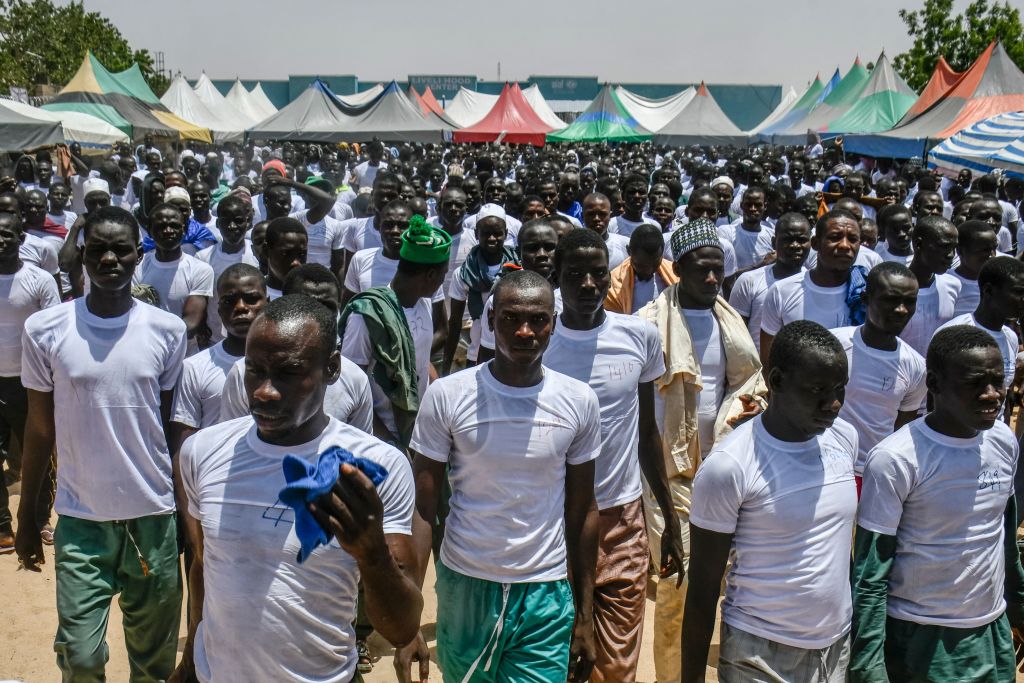ADF STAFF
Officials in the Borno state of Nigeria began recording “droves” of defectors from two competing extremist groups in late 2021. The defectors were from Boko Haram and the Islamic State West Africa Province, also known as ISWAP.
“Various stakeholders in Borno State agreed to accept and forgive the initial 3,900 repentant Boko Haram fighters who have surrendered to troops,” the Nigerian newspaper Blueprint reported. A retired brigadier general, Abdullah Sabi Ishaq, said the defections were the result of the use of the “Borno Model,” which begins with “the use of dialogue” to persuade Boko Haram and ISWAP fighters “to lay down their arms to troops at the various reception centres and embrace peace.” Officials say the model relies heavily on rehabilitation, reconciliation and reintegration techniques.
Today, officials in Nigeria and the Lake Chad Basin are using additional techniques to promote defections, including undermining terrorism supporters and providing increased protection to victims.
ISWAP dates to 2002, when Muhammed Yusuf founded Boko Haram, an Islamic movement in northeastern Nigeria. Tomás F. Husted, an analyst of African affairs, says that in recent years, ISWAP, an IS-affiliated offshoot, “has established itself as the stronger faction and one of the most active IS affiliates globally.” The conflict in the Lake Chad Basin has killed tens of thousands, displaced millions and “fueled a vast humanitarian crisis,” according to Husted.
These days, ISWAP is fighting a rival extremist group, Jama’tu Ahlis Sunna Lidda’awati wal-Jihad, or JAS, as much as it is fighting government forces. The International Crisis Group reported in March that former members of both factions have lost more personnel fighting with each other since 2021 than in confrontations with state militaries.
Although getting fighters to defect is a critical tool in eradicating violent extremism, a 2020 study published by the Frontiers in Psychology journal noted that, “There is a consensus that eradicating violent extremism requires a long-term investment in structural, complex, multilayered interventions from education to social and economic development.” The study noted that short-term strategies are also needed, to assist in preventing or countering violent extremism “in more immediate timespans.” Those strategies include employing counternarratives that challenge the propaganda of extremist groups.
The counternarratives can focus on the atrocities committed by such groups, and emphasize the true teachings of Islam, which promotes peace and compassion. The best deliverers of such messages include local religious leaders and former extremists; both groups are widely regarded as credible. Experts say, however, that such counternarratives must meet “rigorous standards” in terms of accuracy and evidence. The 2020 journal study noted that inaccurate counternarratives have a risk of “backfiring and accelerating further radicalization.”
Defecting from an extremist group is always dangerous; defections from ISWAP are especially so. The Institute for Security Studies has reported that when ISWAP fighters defect to “the government side,” there is almost no going back to ISWAP “because they risk execution on accusations of espionage.”
“Government approaches must continue to encourage defection,” the institute reported. “But they should also go beyond depending on disgruntled commanders and fighters. Strategies are needed that tackle the group on various fronts, including disrupting its financing, blocking routes used for recruitment and movement, and having a clear, practical plan that those who desert ISWAP can support.”
The humanitarian information portal ReliefWeb says that during this critical time in the Lake Chad Basin, authorities should “improve and expand programs for supporting defectors.” But the group said regional authorities and outside partners should continue to take measures to help civilians as well: “They should expand rather than phase out humanitarian assistance, while also developing better targeting protocols to avoid civilian casualties in airstrikes.”

